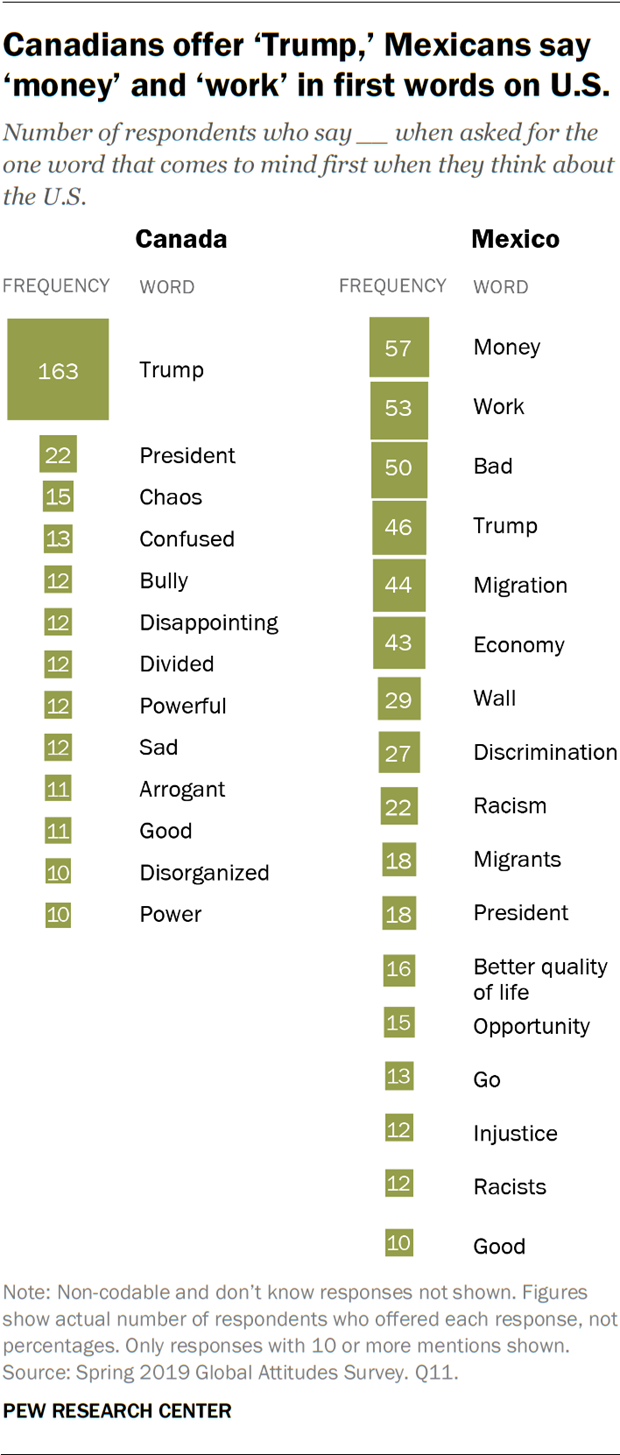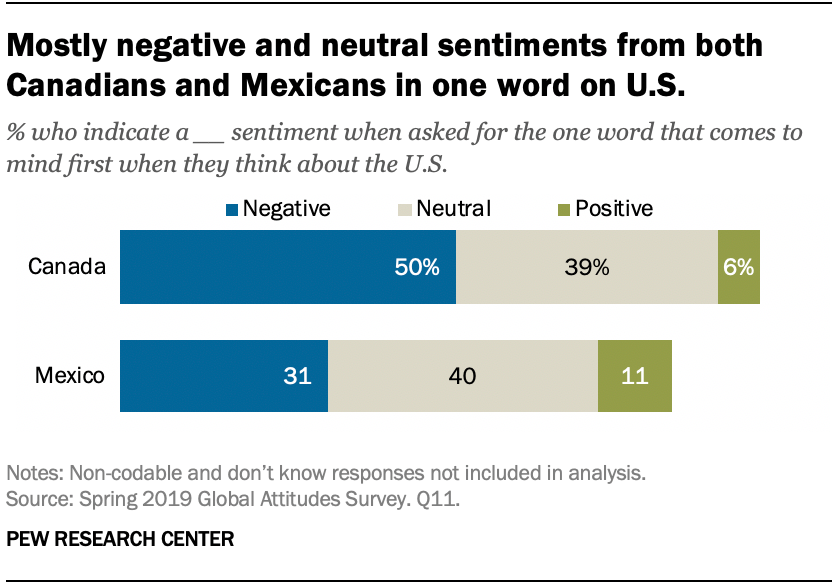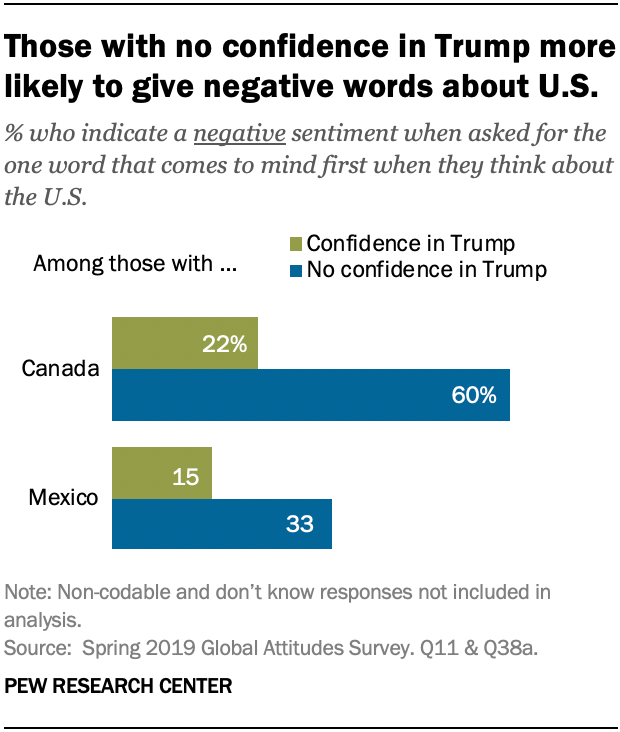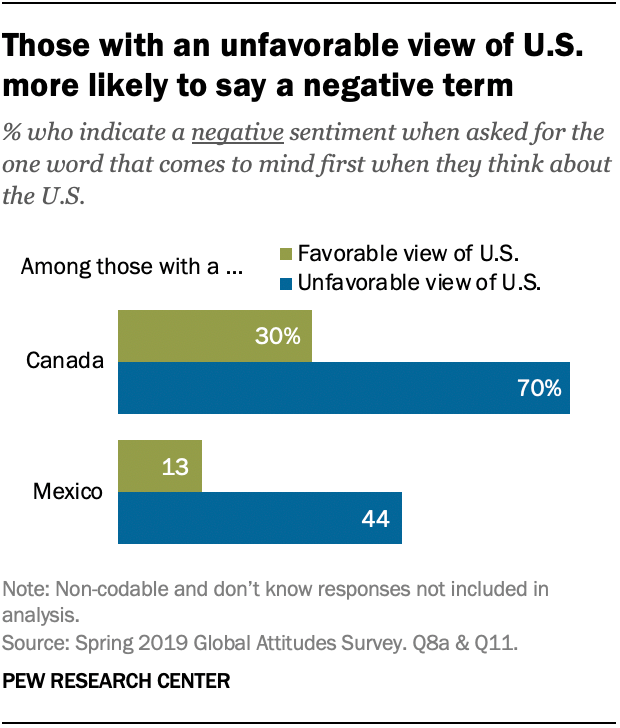 Canadians and Mexicans give different answers when they are asked for the first word that comes to mind when thinking about the United States. President Donald Trump’s name is by far the most frequently mentioned word among Canadians, followed by a range of primarily negative descriptors. Mexicans mention Trump, too, but more often cite words related to economics, according to a Pew Research Center survey conducted in spring 2019. The survey was conducted before the global COVID-19 pandemic, which has potentially affected the lens through which people view the U.S.
Canadians and Mexicans give different answers when they are asked for the first word that comes to mind when thinking about the United States. President Donald Trump’s name is by far the most frequently mentioned word among Canadians, followed by a range of primarily negative descriptors. Mexicans mention Trump, too, but more often cite words related to economics, according to a Pew Research Center survey conducted in spring 2019. The survey was conducted before the global COVID-19 pandemic, which has potentially affected the lens through which people view the U.S.
The list of top words mentioned by Canadians in an open-ended format includes “Trump” and “president,” followed by negative words including “chaos,” “confused” and “bully.” The most commonly mentioned words by Mexicans include “money,” “work” and “migration,” alongside more negative words like “discrimination” and “racism.”
Taken together, these responses provide a more descriptive view of the way Canadians and Mexicans see the U.S. and their relationship with their neighbor. The same Pew Research Center survey found that majorities in both countries lack confidence in Trump to do the right thing on world affairs and disapprove of some of his key foreign policies.
This analysis focuses on open-ended responses from Canadians and Mexicans when asked what one word comes to mind first when they think about the United States today. This analysis relates these open-ended responses to broader attitudes toward the U.S., including favorability toward the country and confidence in President Donald Trump to do the right thing regarding world affairs.
We used data from the Global Attitudes Survey conducted among 1,004 respondents in Canada from May 27-July 10, 2019, and among 1,028 respondents in Mexico from May 23-July 15, 2019. The surveys were conducted face-to-face in Mexico and over the phone in Canada.
Here are the questions used for this report, along with responses, its coding methodology and its survey methodology.
In terms of percentages, the words “Trump” and “president” account for 18% of the responses Canadians give to this question. Only 6% of those polled in Mexico mention “Trump” or “president,” despite the fact that Mexicans have expressed the least confidence in Trump of any country surveyed by the Center since 2017. “Trump,” “president” and “good” are the only words with 10 or more mentions by both Canadian and Mexican respondents.
 Overall, both Canadians and Mexicans use mostly negative or neutral words to describe the U.S., and only a small portion mention a positive word.
Overall, both Canadians and Mexicans use mostly negative or neutral words to describe the U.S., and only a small portion mention a positive word.
The Center coded words as negative or positive only when it was clear that responses leaned one way or the other. Words tied to general themes – like “economy” and “migration” – were coded as neutral in most cases. However, when survey respondents used a generally neutral term as part of a broader statement that was clearly positive or negative, it was coded as such. For example, mentions of simply “Trump” were coded as neutral, whereas a response of “Trump is an idiot” was coded as negative and “Trump is doing a fair job” was coded as positive. “Trump” and “president” made up 40% of all neutral words in Canada, but only 11% of all neutral words in Mexico.
Canadians are more likely than Mexicans to use a negative word to describe the U.S. (50% vs. 31%). Except for “powerful,” “power,” “good” and “confused,” the other words mentioned at least 10 times by Canadians have a negative connotation, such as “disappointing,” “sad” and “disorganized.”
This is not the case among Mexicans, who more frequently offered neutral rather than negative words. Neutral words related to money, work and migration collectively accounted for 26% of the responses provided by Mexicans, while negative words like “bad,” “discrimination,” “racism,” “racists” and “injustice” were also among the most frequently mentioned.
 In both countries, confidence in Trump and feelings toward the U.S. are related to the sentiment of words chosen. Those with no confidence in Trump are at least twice as likely as those who express confidence in him to use a negative word to describe the U.S. (60% vs. 22% in Canada, 33% vs. 15% in Mexico). The same goes for views of the U.S.: Those with an unfavorable view of the U.S. are at least twice as those with a favorable view to use a negative word to describe the U.S. (70% vs. 30% in Canada, 44% vs. 13% in Mexico).
In both countries, confidence in Trump and feelings toward the U.S. are related to the sentiment of words chosen. Those with no confidence in Trump are at least twice as likely as those who express confidence in him to use a negative word to describe the U.S. (60% vs. 22% in Canada, 33% vs. 15% in Mexico). The same goes for views of the U.S.: Those with an unfavorable view of the U.S. are at least twice as those with a favorable view to use a negative word to describe the U.S. (70% vs. 30% in Canada, 44% vs. 13% in Mexico).
In both Mexico and Canada, men are about twice as likely as women to say something positive about the U.S., though the percentages who give positive responses are quite small in both groups (11% of men vs. 5% of women in Canada and 17% of men vs. 8% of women in Mexico). In Mexico, older people are more likely than young people to offer a negative word. This pattern is similar to the one observed in views of the U.S. among Mexicans generally: Older adults in Mexico rate the U.S. more unfavorably than younger adults.
 While few Canadians offer positive words about the U.S., there is some variance depending on where people place themselves ideologically. Canadians on the ideological left are more likely to say something negative (58%) than those on the right (41%). In fact, only 1% of Canadians on the ideological left offer a positive word. Those on the right are more likely to mention neutral words (43%) than those in the center (33%).
While few Canadians offer positive words about the U.S., there is some variance depending on where people place themselves ideologically. Canadians on the ideological left are more likely to say something negative (58%) than those on the right (41%). In fact, only 1% of Canadians on the ideological left offer a positive word. Those on the right are more likely to mention neutral words (43%) than those in the center (33%).
In Mexico, there is a link between wanting to live in the U.S. and the words chosen. Though still a small proportion, those who say they would go to live in the U.S. if they had the means and opportunity are more likely to say something positive about the country than those who would not go (17% vs. 10%). Meanwhile, those who say they would not go are twice as likely (38%) to say something negative as those who would (19%).
Note: Here are the questions used for this report, along with responses, its coding methodology and its survey methodology.


